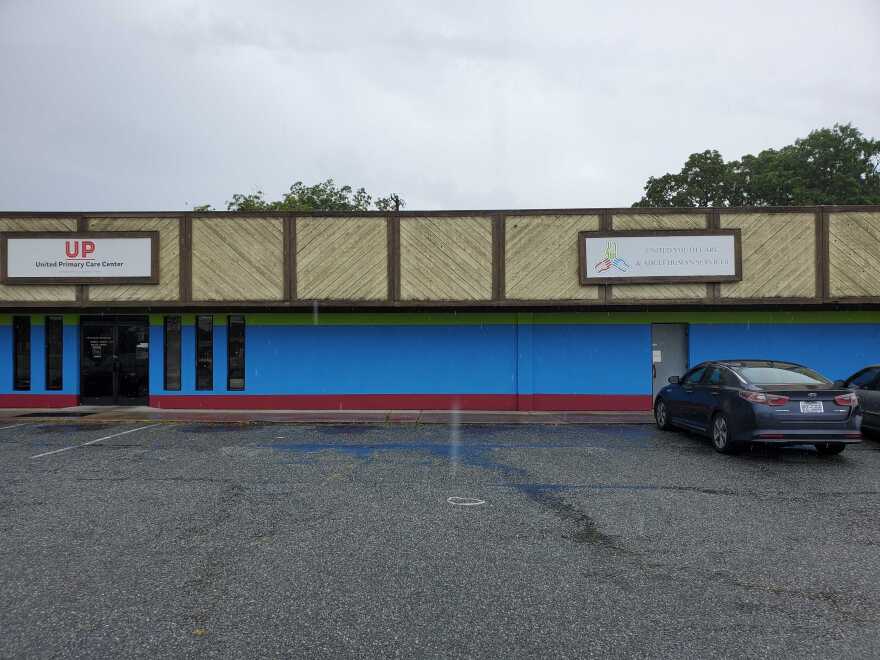On a hot morning in mid-July, Natacia Doolin stood outside the padlocked front door of her deteriorating unit at South Pointe Apartments in Greensboro with her husband, their two children and pretty much everything they owned, waiting to find out if her family would find another place to live.
A few days earlier, Doolin had been told they would need to vacate the apartment, which they found through a housing program connected to a mental health provider.
鈥淎ll day long in the heat,鈥� Doolin said of the wait, as local housing advocates like Partners Ending Homelessness and the Greensboro Housing Coalition scrambled to find space in hotels or shelters. 鈥淚t was bad. I ain鈥檛 gonna sugarcoat it.鈥�
The Doolins are among more than a dozen families who were ripped from their homes in the middle of the pandemic.
But this story is about more than just them. Leaders of the organization that housed them stand accused of offering subsidized housing to homeless people on the condition that they would attend classes that could be billed to Medicaid. In a two-year span alone, that organization received more than $16 million from Medicaid.
According to interviews, court documents, witness testimony and health investigations, it worked like this: United Youth Care Services and United Youth Care Foundation, both led by CEO Donald Booker, offered to sublet apartment units to people like the Doolins through oral 鈥� not written 鈥� agreements, but only if those tenants agreed to receive health care services and drug screenings from the organization. That allowed United Youth Care Services to bill Medicaid for mental health and drug abuse services, as well as laboratory services including drug screenings.
It was bad. I ain't gonna sugarcoat it. -Natacia Doolin
鈥淭o be truthful, it felt like these families had been, frankly, victims 鈥� almost of abuse,鈥� said Brian Haan, executive director of Partners Ending Homelessness.
An investigation by the North Carolina Department of Health and Human Services concluded that United Youth Care Services put clients in substandard housing, and failed to give them adequate medical care to the point that their
from the North Carolina Office of Administrative Hearings by Administrative Law Judge Donald Overby. On Sept. 2, he upheld a decision by DHHS to revoke United Youth Care Services鈥� license to provide mental and behavioral health services.
The judge put it bluntly: 鈥�(United Youth Care Services) subjected clients to exploitation,鈥� Overby wrote in his ruling. 鈥淭he CEO/President was responsible for and paid for substandard housing in various locations ... UYCS used clients with mental health and substance abuse diagnoses to make their housing contingent on the facility obtaining Medicaid reimbursements for services provided by UYCS. There was a threat of losing housing if not in treatment.鈥�
I would not wish what we went through on our worst enemy. -Natacia Doolin
But while it was fighting to keep its license, and unbeknownst to the Doolins and dozens of other clients, United Youth Care Services had stopped paying rent to the apartment complexes where its clients stayed. The Doolins鈥� unit was one of 22, according to court records and accounts from housing advocates, that were ultimately evicted, even though they had no idea that eviction proceedings had started. While evictions were actually delayed during the pandemic, residents said they were caught off guard when the moratorium ended.
Doolin said United Youth Care Services did not tell her she would be evicted until the week it happened. And because she was not listed as the tenant, she had no standing to challenge the eviction in court.
鈥淚 would not wish what we went through on our worst enemy,鈥� Natacia Doolin said.
Booker has denied wrongdoing, and his attorney, Knicole Emanuel, said she plans to appeal the decision. Emanuel is a partner at the law firm Practus, where she specializes in Medicare and Medicaid law.

Troubled Past, Questionable Practices
Formed in 2003, United Youth Care Services was licensed by the state to provide outpatient mental health and drug addiction services. The organization has close ties to United Youth Care Foundation, a nonprofit corporation Booker also leads, which provided housing, mostly to UYCS clients.
This kind of model can make sense, according to advocates, as many people who suffer from mental health diagnoses also suffer from housing insecurity.
In its early years, the organization stayed relatively small. But that quickly changed. Over a four-year period, United Youth Care Services saw its Medicaid revenue increase ten-fold, from less than $1 million in fiscal year 2015 to more than $10 million in fiscal year 2018, Medicaid payment records.
Booker said in an interview that the growth was due to marketing.
鈥淲e got aggressive with our marketing material. We got aggressive with our face-to-face interaction, our flyers,鈥� Booker said, adding that they did 鈥済eofencing,鈥� referring to a strategy that automatically sends emails, text messages or smartphone notifications to people in a certain area.
But investigators found there was more at play.
UYCS saw its Medicaid revenue increase from less than $1 million in 2015 to more than $10 million in 2018.
Surveyors with the state Department of Health and Human Services described a system in which United Youth Care Services staff would single out people who were homeless and who qualified for Medicaid, then offer them housing, but only on the condition that they attended classes.
For example, a sign was posted inside one residence that read: 鈥淎ttention: if you鈥檙e not attending class daily, rent is $350, no exceptions,鈥� according to the OAH ruling.
But Doolin, the woman whose family was evicted from South Pointe Apartments, said she had to pay $400 every month regardless of whether she attended. She said she kept making payments, even after UYCS stopped paying rent to the apartment complex.
UYCS鈥檚 revenue growth coincided with a dramatic increase in clients, visits and procedures. In fiscal year 2017, UYCS billed for just 2,150 procedures and 348 clients. Two years later, those figures jumped to 56,173 procedures and 1,905 clients, according to Medicaid payment data.
UYCS had tax issues as well. The OAH ruling showed Booker believed United Youth Care Services was a nonprofit and exempt from federal taxes. This was incorrect, and in fact, UYCS has had tax liens against it totalling more than $600,000.
Booker said he was on a payment plan with the federal government.

鈥楻evolving Door鈥�
DHHS investigators also found that the housing was inadequate and that clients' clinical needs were not being met.
Advocates said clients of UYCS were often placed in small one- and two-bedroom apartments with another family. Some of these units didn鈥檛 have working electricity or running water, according to advocates. Others had serious mold issues. And often, the clients told housing advocates, they would be moved around, sometimes staying only weeks at a time in a specific unit.
鈥淭hat鈥檚 a revolving door over there,鈥� said Josie Williams, executive director of the Greensboro Housing Coalition. 鈥淵ou move into that unit. You may stay a week. You may stay a month. You may stay a year. But as soon as you leave, regardless of whatever the reason is, they鈥檇 move the next person into that unit.鈥�
Booker acknowledged cramped living quarters, but argued that the organization had limited resources and was trying to help as many people as possible, including single mothers with multiple children and no income.
鈥淎nd we would say, 鈥榃ell, this (is) all we've got right now, ma鈥檃m,鈥欌€� Booker said. 鈥淭hat's all we got right now.鈥�
Michelle Kennedy is the executive director of Interactive Resource Center, a day center for people experiencing homelessness, and also a member of the Greensboro City Council. At the hearing, she testified that she inspected the housing and determined it to be 鈥渟ubstandard in her opinion,鈥� according to the OAH ruling.
State health regulators found that clinical programs offered by UYCS . DHHS investigators noted that clinical staff did not have the proper training, 鈥測et continued to provide services to clinically fragile dual-diagnosed clients.鈥�
Some of these units didn't have working electricity or running water. Others had serious mold issues.
鈥淭reatment plans were not followed so clients鈥� treatment needs, medical needs, medication management and psychiatric evaluations were not being completed or known, therefore, clients鈥� clinical needs were neglected,鈥� their report said.
DHHS initially , but Booker appealed.
Under North Carolina Administrative Code, organizations that appeal accusations of misconduct can keep their licenses until an administrative judge issues a final ruling. On Sept. 14, Emanuel, Booker鈥檚 attorney, told the NC Watchdog Reporting Network that Booker and UYCS did nothing wrong and that they plan to appeal.

Housing Clients In Need
Booker himself has denied any wrongdoing.
He said he wanted to offer mental health and addiction services to needy people in the area. By 2009, after being in business for five years, he said he realized that many people suffering from mental illness and drug addiction also suffered from housing insecurity. That鈥檚 why, he said, he formed the nonprofit to help find housing. He said the funding for United Youth Care Foundation came almost exclusively from profits from United Youth Care Services.
"We were housing a lot of homeless people,鈥� he said. 鈥淚 was damn near going broke trying to help everybody that came down here and said they need help.鈥�
Just hours before the OAH ruled against him on Sept. 2, Booker spoke with NC Watchdog Reporting Network for more than an hour.
鈥淚 can't go to sleep at night, knowing that there's homelessness in our community, there's people hungry in our community,鈥� he said. 鈥淎nd I can't go to bed with that on my back.鈥�
He painted a much different picture of himself and United Youth Care Services than the one in DHHS violation reports and court documents. His work, he said, has received recognition 鈥渇or helping.鈥�
"So the good definitely outweighs the bad. I mean, definitely,鈥� he said.
Booker repeatedly turned blame on clients, the very people he purported to help, saying they often struggled with drug addiction and couldn鈥檛 be trusted to tell the truth.
鈥淎nd so there's a few bad apples who complain.鈥� he said. 鈥淵ou can expect that from this population. And I hate for the media or anybody else not to see this. I think we proved this without a shadow of a doubt."
In his ruling, Judge Overby found some client testimony questionable, though he did not dismiss all of it.
Booker could not be reached after the ruling, which upheld the DHHS Division of Health Service Regulation鈥檚 decision to fine United Youth Care Services a total of $56,000 and revoke its license. Emanuel, his attorney, was steadfast in her opinion that Overby erred in his ruling and said she was confident it would be overturned on appeal.
But even if the decision is upheld, it doesn鈥檛 put a roof over the heads of UYCS clients who were evicted.
Natacia Doolin, her husband and their two children are staying at a hotel room in Greensboro after being evicted from South Pointe Apartments, but it is only covered until Sept. 21. In the meantime, she is keeping an eye out for other housing opportunities.
Doolin says United Youth Care Services should refund the money its clients paid in rent.
鈥淲e struggled to get that in fear of being on the street,鈥� she says. 鈥淎nd look what happened. We ended up on the street anyway.鈥�
This story was jointly reported and edited by Frank Taylor of Carolina Public Press; Ames Alexander of The Charlotte Observer; Jordan Schrader of The News & Observer; Nick Ochsner of WBTV; Emily Featherston of WECT; Tyler Dukes of WRAL; and Jason deBruyn, Dave DeWitt and Will Michaels of 吉彩网网站.








